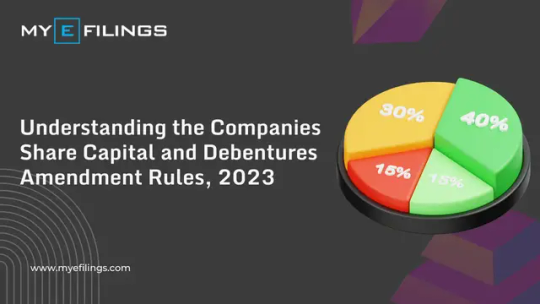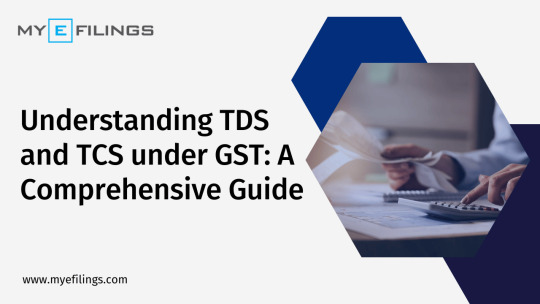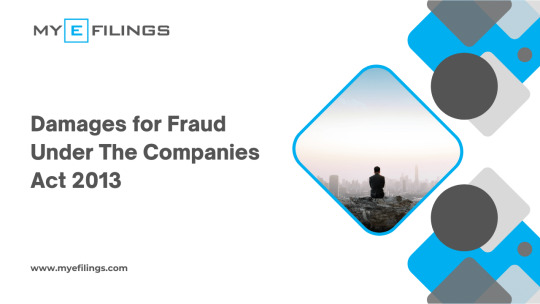#myefilings
Explore tagged Tumblr posts
Text

Form DRC-03 under the Goods and Services Tax (GST) regime in India is related to the payment of tax, interest, or any other amount due to the government as a result of a voluntary disclosure of errors or omissions in your GST returns.
Legal Compliance: One of the primary advantages of using DRC-03 is that it allows taxpayers to come into compliance with the law by rectifying errors or omissions in their previous GST returns. This helps in avoiding potential legal issues and penalties that may arise from non-compliance.
Avoidance of Penalties: By voluntarily disclosing errors and paying the tax and interest due through DRC-03, businesses can potentially avoid or reduce the penalties that may be imposed by tax authorities if errors are detected through audits or investigations.
Reduced Litigation: The use of DRC-03 can help in reducing the likelihood of disputes and litigation with tax authorities. Voluntary disclosure demonstrates a willingness to correct mistakes, which can lead to more amicable resolutions with tax authorities.
Preservation of Reputation: Correcting errors through DRC-03 can help preserve the reputation of a business. It shows transparency and a commitment to rectify any unintentional mistakes in GST filings.
Certainty: It provides certainty to taxpayers about the amount they need to pay for the disclosed errors, including the applicable interest. This clarity can be beneficial for financial planning.
Avoiding Future Liability: Correcting errors promptly can prevent them from compounding and becoming a bigger issue in the future. This can ultimately save businesses from having to pay larger amounts in the long run.
Peace of Mind: Using DRC-03 can provide peace of mind to taxpayers knowing that they have addressed any potential issues with their GST filings and are in compliance with the law.
Read more: https://myefilings.com/drc-03-under-gst/
0 notes
Text
Simplify your Business Compliance with Mfiling.com
In the ever-evolving landscape of business, navigating the intricacies of legal compliance and financial obligations can be a daunting task. Entrepreneurs and business owners often find themselves grappling with the complexities of registration and income tax filing, consuming valuable time and resources that could otherwise be allocated to growing their ventures. Enter MFiling.com – the all-in-one solution designed to streamline and simplify your business compliance needs.
Unveiling MFiling.com: A Holistic Approach to Compliance
MFiling.com emerges as a comprehensive platform offering a suite of services tailored to meet the diverse needs of businesses across various sectors. Whether you're a budding startup or an established enterprise, the platform caters to your requirements with precision and efficiency.
Seamless Business Registration
The process of setting up a business can be overwhelming, involving numerous legal formalities and paperwork. MFiling.com alleviates this burden by providing a user-friendly interface that guides users through the entire registration process. From obtaining the necessary licenses to fulfilling statutory requirements, the platform offers step-by-step assistance, ensuring a hassle-free experience.
Effortless Income Tax Filing
Navigating the labyrinth of income tax regulations is a perpetual challenge for businesses. MFiling.com simplifies this ordeal by offering a streamlined approach to income tax filing. With intuitive tools and expert guidance, users can swiftly file their taxes, leveraging deductions and incentives while ensuring compliance with tax laws.
The MFiling.com Advantage: What Sets Us Apart
Expert Assistance at Your Fingertips
At MFiling.com, we understand that every business is unique. Our platform combines cutting-edge technology with the expertise of seasoned professionals, providing personalized assistance to address your specific needs. From legal advisors to tax consultants, our team stands ready to offer guidance and support at every stage of your compliance journey.
Robust Security and Confidentiality
Security and confidentiality are paramount in the realm of business compliance. With MFiling.com, rest assured that your sensitive data and information are safeguarded using state-of-the-art security protocols. We prioritize the confidentiality of your business details, ensuring a secure environment for all your transactions.
Time and Cost Efficiency
Time is a valuable commodity in the business world. MFiling.com values your time by offering an efficient, time-saving solution. By streamlining processes and reducing administrative overheads, the platform enables you to focus on your core business activities while ensuring compliance with regulatory requirements.
Your Journey with MFiling.com: Simple, Efficient, and Empowering
Embracing MFiling.com means embarking on a transformative journey towards simplified compliance and empowered business operations. Whether it's registering your business entity or filing income tax returns, our platform empowers you to navigate the regulatory landscape with confidence and ease.
Join the MFiling.com Community Today!
Say goodbye to the complexities of business compliance. Experience the convenience and efficiency of MFiling.com – your trusted partner for seamless business registration and income tax filing services. Join our community today and embark on a journey towards business success, unburdened by compliance woes.
In a world where time is of the essence, let MFiling.com be your catalyst for streamlined, hassle-free compliance – because your business deserves nothing less.
Ready to simplify your business compliance? Explore MFiling.com today and unlock a world of seamless registration and tax filing services tailored to meet your business needs.
Disclaimer: This blog post is for informational purposes only and does not constitute legal or financial advice. Readers are encouraged to consult with professional advisors regarding their specific business requirements and compliance obligations.
www.mfiling.com +91 8952006555 +91 8560026002
For inquiries, support, or partnerships, reach out to us at [email protected] or visit www.mfiling.com for more information.
Conclusion
MFiling.com stands as a beacon of simplicity and efficiency in the realm of business compliance. By amalgamating technology, expertise, and a commitment to customer satisfaction, the platform redefines the way businesses approach registration and income tax filing services. Simplify, streamline, and succeed – embark on your compliance journey with MFiling.com today.
0 notes
Link
Facing difficulties in GST registration? Get the expert advice, checkout our simple and useful guide on GST registration. . . Follow us on Linkedin: https://www.linkedin.com/company/myefilings/ Like our Facebook Page: https://www.facebook.com/myefilings/ Follow us on Instagram: https://www.instagram.com/myefilings/
#MyEfilings#TrademarkRegistration#GSTRegistration#OPCRegistration#LegalServices GSTConsultant#Proprietorship#IncomeTaxIndia#gstupdates#CopyrightRegistration#GSTReturn
1 note
·
View note
Link
0 notes
Text

Supporting early-stage investments in startups is crucial for fostering innovation and economic growth. To encourage angel investors to provide funding to startups, many countries offer income tax benefits and incentives. These incentives can vary significantly from one jurisdiction to another, but here are some common income tax benefits for angel investors in startups. Read more: https://myefilings.com/supporting-early-stage-investments-income-tax-benefits-for-angel-investors-in-startups/
0 notes
Text

Trademark Valuation: Trademark valuation refers to the process of determining the monetary value of a trademark or brand name. Trademarks are valuable assets for businesses as they can represent brand recognition, customer loyalty, and goodwill. There are several methods for valuing trademarks:
Market-Based Approach: This approach considers the prices of comparable trademarks or brand names in the marketplace. It involves analyzing the sales of similar trademarks to estimate the value of the subject trademark.
Income-Based Approach: This approach assesses the income generated by the trademark over its useful life. It includes methods such as the relief from royalty method, which calculates the value by estimating the royalties that would be paid if the trademark were licensed.
Cost-Based Approach: This approach considers the cost incurred to create or acquire the trademark. It involves calculating the expenses related to trademark development, registration, and maintenance.
Discounted Cash Flow (DCF) Analysis: DCF analysis estimates the present value of future cash flows generated by the trademark. It involves predicting future revenues and expenses related to the trademark and discounting them to their present value.
Brand Strength Analysis: This method assesses the strength and recognition of the brand in the market. A stronger brand is typically valued higher due to its potential to generate more revenue.
Read more: https://myefilings.com/comprehensive-guide-trademark-valuation-its-taxation/
0 notes
Text

Types of Share Capital:
Authorized Share Capital: This is the maximum value of shares that a company is authorized to issue as per its memorandum of association. It represents the upper limit of capital that the company can raise from its shareholders.
Issued Share Capital: This is the portion of authorized share capital that the company has actually issued and allotted to shareholders.
Subscribed Share Capital: This refers to the portion of issued share capital that shareholders have agreed to subscribe to or purchase.
Paid-Up Share Capital: This is the amount of money that shareholders have already paid to the company for the shares they have subscribed to. It's the actual capital received by the company from its shareholders.
Read more: https://myefilings.com/understanding-the-companies-share-capital-and-debentures-amendment-rules-2023/
#myefilings#india#taxes#income tax#investment#share capital#economic#capital gains tax#equity#Issued Share Capital#Paid-Up Share Capital
0 notes
Text

Understanding TDS (Tax Deducted at Source) and TCS (Tax Collected at Source) under the Goods and Services Tax (GST) regime is crucial for businesses and individuals involved in transactions subject to these provisions. Here's a comprehensive guide to help you grasp the concepts of TDS and TCS under GST.
Read more: https://myefilings.com/understanding-tds-and-tcs-under-gst-a-comprehensive-guide/
0 notes
Text

A Hindu Undivided Family (HUF) is a distinct legal entity recognized under Indian tax law. It is a form of joint family business that carries forward the concept of ancestral property and joint family ownership. Forming an HUF in India can offer certain tax benefits and obligations.
Tax Benefits:
Separate Entity: An HUF is treated as a separate legal entity for taxation purposes. It can have its own PAN (Permanent Account Number) and can file income tax returns separately.
Income Splitting: One of the significant advantages of forming an HUF is the ability to split income among family members. This can be useful for tax planning, as it allows income to be distributed to lower-income family members, thereby potentially reducing the overall tax liability.
Exemption Limits: Similar to individuals, an HUF is entitled to avail of various tax exemptions and deductions under the Income Tax Act. This includes exemptions on basic income, deductions for investments, and other tax-saving options.
Gifts and Inheritances: Members of an HUF can make gifts and inheritances within the family without attracting gift tax or income tax, subject to certain conditions.
Holding Ancestral Property: An HUF can hold and manage ancestral property as a single entity, preserving the family's assets and wealth.
Tax Obligations:
Filing Income Tax Return: An HUF is required to file its income tax return separately, reporting all its income, expenses, and deductions. The return should be filed using its unique PAN.
Tax Rates: An HUF is taxed at the same rates as individuals. However, the tax slabs and rates may vary from year to year based on government regulations.
Maintaining Records: Proper records of income, expenses, investments, and other financial transactions should be maintained for transparency and in case of any scrutiny by tax authorities.
Clubbing of Income: Certain provisions of the Income Tax Act prevent the misuse of HUFs for tax evasion. For example, income generated from assets transferred by an individual to the HUF can be clubbed with the income of the individual if certain conditions are not met.
Compliance: HUFs need to comply with tax-related deadlines, including filing income tax returns by the due date, paying any taxes owed, and adhering to other relevant tax obligations.
Read more: https://myefilings.com/the-tax-benefits-and-obligations-of-forming-a-hindu-undivided-family-huf/
#income tax#income tax return#tax returns#taxation#myefilings#business#taxes#company#india#gst#income taxes#finance
0 notes
Text


Data Processing Regulations: Such bills often define how personal data can be collected, processed, stored, and shared. They might require organizations to obtain explicit consent from individuals before collecting and using their data.
User Rights: These bills tend to grant individuals specific rights over their personal data, such as the right to access their data held by organizations, the right to correct inaccurate data, and the right to request deletion of their data.
Transparency: Privacy bills often emphasize transparency, requiring organizations to provide clear and understandable information about their data processing practices, including purposes, methods, and recipients of the data.
Data Security Measures: Regulations commonly stipulate that organizations must take appropriate measures to protect the personal data they hold, including safeguards against breaches and unauthorized access.
Cross-Border Data Transfer: Data protection bills may include provisions about transferring personal data across borders, ensuring that data transferred to other countries offers the same level of protection as it does in the home country.
Accountability and Penalties: These bills often establish accountability mechanisms, making organizations responsible for their data handling practices. Non-compliance may lead to fines or other penalties.
Sensitive Data Protection: Certain types of data, like health information or biometric data, might receive special protection due to their sensitivity.
Consent Requirements: Privacy bills might mandate that organizations obtain explicit and informed consent from individuals before processing their data, especially when it comes to sensitive information.
Data Breach Notification: Regulations commonly require organizations to notify individuals and relevant authorities in the event of a data breach that could compromise personal data.
Read more: https://myefilings.com/how-the-digital-personal-data-protection-bill-2023-will-protect-consumer-privacy/
0 notes
Text

When a company decides to distribute dividends to its shareholders, it must determine where the funds will come from. This analysis explores the various sources of payment of dividends, including profits, reserves, and borrowing, providing insights into the financial mechanisms behind dividend distribution. Debt Financing: In some cases, companies may choose to take on debt to fund dividend payments. This can be done through issuing bonds or taking out loans. However, relying too heavily on debt financing for dividends can be risky, as it can increase a company's debt burden and financial obligations. Companies that choose to use debt financing for dividend payments must carefully consider their ability to repay the debt in the future. They must also assess the impact of increased debt on their overall financial health and creditworthiness. While debt financing can provide immediate funds for dividend distribution, it is important for companies to strike a balance between debt and equity financing to maintain a sustainable dividend policy. Additionally, investors should be aware of a company's debt levels and its ability to manage its financial obligations before making investment decisions based on dividend payments.
Read more: https://myefilings.com/dividend/
0 notes
Text

The Act aims to protect the interests of shareholders, investors, and other stakeholders and maintain the integrity of the corporate sector. Below are some important provisions related to damages for fraud under the Companies Act, 2013:
Section 447 - Punishment for Fraud: Section 447 of the Companies Act, 2013, deals with the punishment for fraud. If any person is found to be involved in fraudulent activities, they may be punished with imprisonment for a term not less than six months, which may extend to ten years. Additionally, they may be liable to pay a fine that is equal to or greater than the amount involved in the fraud.
Section 448 - Punishment for False Statement: Under Section 448, if any person makes a false statement or provides false information in any company-related documents, financial statements, or records, they can be punished with imprisonment for a term that may range from six months to ten years. They may also be liable to pay a fine that is equal to or greater than the amount involved in the fraud.
Section 449 - Punishment for False Evidence: Section 449 deals with the punishment for false evidence. If any person knowingly provides false evidence during any company-related proceedings, they can be punished with imprisonment for a term that may range from three years to seven years. They may also be liable to pay a fine.
Section 450 - Punishment for Misleading Statements: Section 450 provides for punishment if any person publishes or circulates misleading information or statements with the intention to deceive investors, shareholders, or the public. Such individuals may be punished with imprisonment for a term that may range from three years to five years, along with a fine.
It's important to note that these provisions are applicable to individuals who are involved in fraudulent activities or provide false information intentionally. The penalties mentioned in these sections are significant to deter individuals from engaging in fraudulent practices and to safeguard the interests of the company and its stakeholders.
Read more: https://myefilings.com/damages-for-fraud-under-the-companies-act-2013/
#company registration#damages#fraud#myefilings#business#taxes#india#company#accounting#finance#income taxes#income tax#gst#tax fraud#reuters#regulations
0 notes
Text

The LLP (Limited Liability Partnership) Agreement holds several benefits for the partners involved in the LLP:
Limited Liability: The primary advantage of an LLP is that it offers limited liability protection to its partners. This means that the personal assets of partners are not at risk for business debts and liabilities. Each partner is responsible for their actions, and they are not liable for the misconduct or negligence of other partners.
Flexible Management Structure: LLPs allow flexibility in the management structure. Partners can decide the roles and responsibilities of each partner according to their expertise and contribution to the business. This provides a more adaptable and customized management approach.
Ease of Formation: Forming an LLP is relatively straightforward and involves less paperwork and compliance compared to a private limited company. The registration process is quicker, making it a favorable option for startups and small businesses.
No Minimum Capital Requirement: LLPs do not require a minimum capital contribution, unlike private limited companies. Partners can contribute varying amounts of capital, depending on their agreed-upon terms.
Ease of Transfer of Ownership: The ownership interest in an LLP can be easily transferred or assigned to another person by way of a written agreement. This facilitates changes in ownership without affecting the LLP's legal existence.
Tax Benefits: LLPs offer the benefit of "pass-through taxation," where the LLP itself is not taxed. Instead, the profits are passed on to the partners, and they are individually taxed based on their share in the LLP.
Separate Legal Entity: Like a company, an LLP is a separate legal entity, which enhances its credibility and trustworthiness in the eyes of clients, suppliers, and financial institutions.
Perpetual Succession: LLPs have perpetual succession, meaning the LLP continues to exist even if one or more partners leave or new partners join. This ensures continuity in the business operations.
Confidentiality: LLP Agreements are not required to be filed publicly, which provides a level of confidentiality regarding the LLP's internal affairs and agreements among the partners.
Flexibility in Profit Sharing: LLP partners can agree on the distribution of profits based on their contributions, efforts, or any other mutually agreed-upon terms. This flexibility allows for more equitable profit-sharing arrangements.
Foreign Investment: LLPs can attract foreign investment as they offer a business structure with limited liability and simplified compliance requirements.
Regulatory Compliance: While LLPs have fewer compliance requirements compared to companies, they still offer a degree of regulatory structure, ensuring better governance and transparency within the organization.
Overall, the LLP Agreement provides partners with legal protection, operational flexibility, and taxation benefits, making it a preferred choice for certain types of businesses, especially those with a collaborative business structure. However, it is essential for partners to draft a comprehensive and well-defined LLP Agreement to address specific business needs and ensure smooth functioning throughout the partnership.
Read more: https://myefilings.com/format-of-supplementary-llp-agreement-for-admission-registration-of-partner/
#myefilings#business#taxes#india#company#limited liability partnership#private limited company#business registration#small business
0 notes
Text

Company registration holds significant importance for businesses for the following reasons:
Legal Entity: Registration establishes a company as a separate legal entity distinct from its owners. This means that the company can conduct business, enter into contracts, and sue or be sued in its own name, providing limited liability protection to its shareholders.
Limited Liability Protection: One of the primary advantages of registering a company is that the personal assets of shareholders are protected from the company's debts and liabilities. Shareholders are only liable for the amount they have invested in the company.
Credibility and Trust: Registered companies often gain more credibility and trust among customers, suppliers, and partners. Registration shows that the business is committed to long-term operations and is willing to comply with legal and regulatory requirements.
Fundraising and Investment: Registered companies have better access to various sources of funding, including loans, venture capital, and equity investments. Investors and lenders are more likely to invest in a registered company due to the limited liability protection it offers.
Brand Protection: Registering the company name and logo as trademarks provides legal protection against unauthorized use by competitors, helping to safeguard the brand's reputation and value.
Perpetual Succession: A registered company enjoys perpetual succession, meaning it continues to exist even if its shareholders or directors change. This provides stability to the business and ensures continuity in operations.
Ease of Transfer of Ownership: Shares of a registered company can be easily transferred between shareholders, allowing for smooth ownership changes and flexibility in raising capital.
Access to Government Contracts and Tenders: Many government contracts and tenders require bidders to be registered companies, providing access to a wider range of business opportunities.
Tax Benefits: Registered companies may avail certain tax benefits and incentives provided by the government to promote entrepreneurship and business growth.
Read more: https://myefilings.com/business-registration/
#one person company#myefilings#business#company#business registration#small business#private limited company registration#nidhi company registration#limited liability partnership#private limited company#startup registration#gst#income taxes#finance#taxes#india#income tax#accounting
0 notes
Text

Preparation of Name: Choose a unique name for your Private Limited Company. The name should not be identical or too similar to the name of any existing company or trademark in India. Ensure the name adheres to the guidelines set by the Ministry of Corporate Affairs (MCA).
Name Availability Check: Before proceeding with the formal application, you need to check the availability of the proposed name. The MCA provides an online search facility called "RUN" (Reserve Unique Name) on its website where you can check if your desired name is available or not.
Filing the Name Approval Application: Once you have a unique name that is available, you can proceed to file the name approval application. You can do this by submitting the "RUN" form on the MCA portal (https://www.mca.gov.in/) with the necessary details, such as the proposed company name, the significance of the name, and the main business activity.
Pay the Application Fee: There is a fee associated with filing the name approval application, which you need to pay online through the MCA portal.
Name Approval Process: The Registrar of Companies (RoC) will review your name application. They will check if the proposed name complies with the rules and regulations and if it's not already taken. If there are any issues or objections, they will communicate the same to you, and you may need to make adjustments to the name or provide additional information.
Name Approval Certificate: If the Registrar finds the proposed name acceptable, they will issue a Name Approval Certificate. This certificate confirms that the name has been reserved for your company for a period of 20 days from the date of approval.
Incorporation of the Company: Within the validity period of the Name Approval Certificate (20 days), you need to complete the process of incorporating the Private Limited Company. This includes preparing and filing the required incorporation documents, such as the Memorandum of Association (MoA) and Articles of Association (AoA), with the RoC.
Read more: https://myefilings.com/how-to-check-company-name-availability/
#private limited company#company name approval#name approval#myefilings#business#taxes#company#gst#startupindia
0 notes
Text

In simpler terms, Trademark Class 14 covers goods that are made from or related to precious metals, jewelry, gemstones, and watches. Some examples of goods that fall under Class 14 include:
Jewelry: Rings, necklaces, bracelets, earrings, brooches, pendants, charms, cufflinks, etc.
Precious metals: Gold, silver, platinum, and alloys thereof used in the manufacture of jewelry or other goods.
Precious stones: Diamonds, emeralds, rubies, sapphires, pearls, etc.
Horological instruments: Watches, clocks, chronometers, timepieces, watch straps, watch cases, etc.
Costume jewelry: Fashion jewelry made from non-precious metals, gemstones, or synthetic materials.
Art objects: Decorative objects made of precious metals or adorned with gemstones.
It's important to note that this classification is not exhaustive, and there may be additional goods and services that can be classified under Class 14. Read more: https://myefilings.com/trademark-class-14-jewelry-precious-metals-and-gemstones/
0 notes